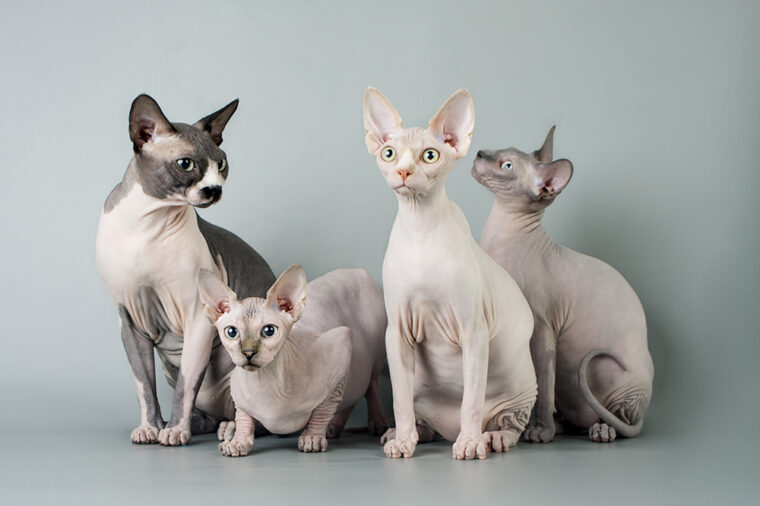
The acrobatic Sphynx cat is known for its big personality and vocal attention-seeking behavior, but these unusual cats also need lots of attention and care from their owners to be both healthy and happy during their lives. If you’re the proud owner of a sphynx (or are thinking about bringing one home), a few health concerns come along with this unique cat’s big personality.
Read on to learn about some of the common concerns you need to be aware of to take care of this feisty feline.
The 5 Sphynx Cat Health Problems
1. Oily Skin
Some Sphynx owners are surprised by the amount of oil their hairless pet produces compared to their furry counterparts. In furred cats, the oil is absorbed by their fur, but the oils from the Sphynx’s skin are easily transferred to fabric and other surfaces. Sphynx cats will need occasional baths to remove dirt trapped by the oils on their skin.
A soap-free shampoo with aloe, such as Earthbath Oatmeal & Aloe Fragrance-Free Dog & Cat Shampoo, will be gentle on your cat’s skin. Depending on your cat’s oiliness, bathe them once a week or month, and then dry them off with a warm towel to prevent chapping and cracking of the skin. Their ears should be cleaned regularly to remove excess earwax to prevent ear infections.
2. Protection From Sun and Cold Exposure
It will also be vitally important to protect your Sphynx’s skin from exposure to the sun and cold temperatures. The lack of fur means they can be prone to sunburn and should be kept indoors. During the winter months, the colder temperatures will leave your kitty feeling cold without a fur coat, and it will need your help to stay warm.
The first step should be buying some soft fabric clothing to avoid irritating its skin while keeping your cat warm. Placing cozy blankets in some of your cat’s favorite spots will also help keep it warm. A heated bed, such as the K&H Pet Products Thermo-Snuggle Cup Bomber Heated Dog & Cat Bed, is also a great option and will keep your favorite kitty toasty warm on colder days.

3. Periodontal Disease
Sphynx cats can develop periodontal disease and are known to lose their teeth if they don’t receive regular cleanings. Food residue can build up on their teeth, which then hardens into tartar, leading to inflammation of the gums and teeth. One way to help prevent tartar buildup is to brush your cat’s teeth every day.
You should start to train your cat to accept toothbrushing when they’re young so they’re used to the daily process. If you’re trying to train an older cat to accept tooth brushing, you can start by using juice from canned tuna on their gums to make the whole experience palatable. You can then start using an animal-friendly toothbrush and cat toothpaste, such as Bundle: Virbac C.E.T. Tartar Control Seafood Flavor Toothpaste + Dog & Cat Toothbrush, to brush their teeth.
Dental treats and a specially formulated diet provided by your vet can also help prevent dental loss. Talk to your vet about in-office tartar removal to provide deep cleaning and prevent tooth loss.
4. Urticaria Pigmentosa
Some Sphynx cats come from families predisposed to a skin condition called urticaria pigmentosa (hives), which can make your cat break out in itchy, small red bumps. Other factors can also cause the skin condition in your pet, such as fleas, mites, food allergies, bacterial and fungal infections, or even an autoimmune disease. Left untreated, sores can result and become infected. If you see hives on your pet, contact your vet so they can evaluate your pet and determine an appropriate treatment.

5. Hypertrophic Cardiomyopathy
Sphynx cats are generally healthy overall, but they do have a genetic predisposition to a heart condition called hypertrophic cardiomyopathy. The left valve of the heart is naturally thicker than the other valves, but in cases of hypertrophic cardiomyopathy, the valve is abnormally thick or enlarged.
Hypertrophic cardiomyopathy can occur in cats as young as three months but more often occurs between 5–7 years of age in most cats. There are treatments available for this condition, so contact your vet immediately if you suspect your pet is having heart issues.
Conclusion
Sphynx cats are known for their big personalities and their loving, loyal attention to their owners. Whether you’re a new Sphynx owner or have had one for years, there are some common concerns you need to watch out for to make sure your pet is healthy. Your Sphynx will likely need a bath at least once a month to combat grunge accumulating on their oily skin.
The hairless skin of the Sphynx could lead to sunburn, so they should be kept indoors, and in colder temperatures, they will need clothing and a warm place to sleep. Periodontal disease, urticaria pigmentosa, and hypertrophic cardiomyopathy are all health issues that can occur in Sphynx cats. Reach out to your vet if you notice any of these issues so your pet can receive proper care and treatment.
Featured Image Credit: Asichka, Shutterstock








